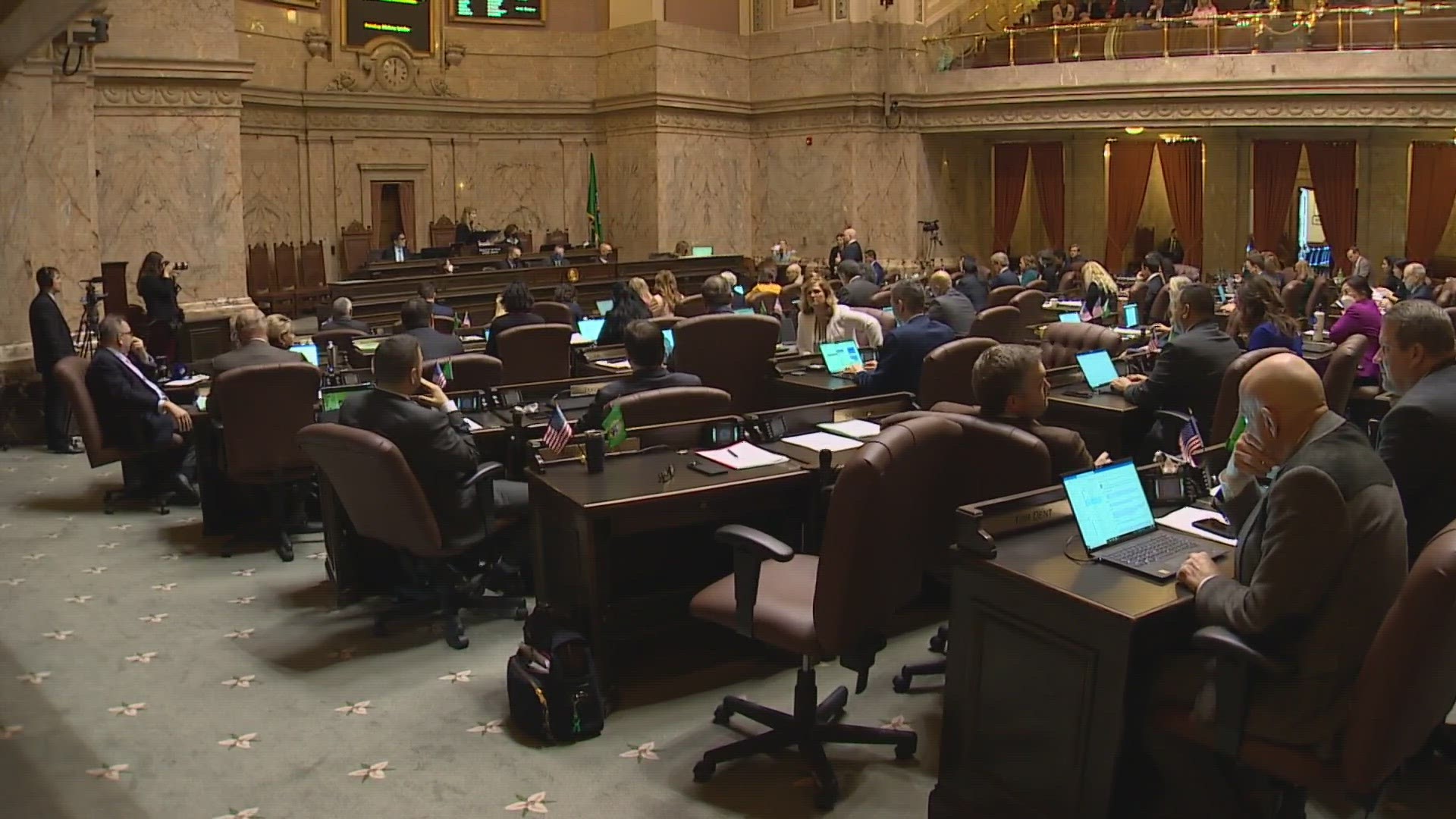OLYMPIA, Wash. — A last-minute rejection of a compromise inside the state Capitol stunned Washington leaders Sunday night: a contentious Senate bill on drug possession misfired in the House, even after intense negotiations.
"We cannot accept decriminalization in the middle of a fentanyl crisis," said Governor Jay Inslee, D-Washington.
Previously in the day, Inslee expressed encouragement and optimism about the Legislature passing Senate Bill 5536, which had been intensely negotiated to serve the interests of legislators pushing for a combination of both treatment and punishment.
In a 43 to 55, House lawmakers voted it down Sunday night with only a handful of hours left in the legislative session.
"Unfortunately I can't vote for this bill because it's a gross misdemeanor," said Rep. Tarra Simmons, D-23rd District.
The current state law expires in a couple of months, which classifies drug possession as a misdemeanor on the third arrest. There is a maximum sentence of 90 days in jail, up to $1,000 in fines, or both after a third arrest.
Senate Bill 5536 proposed that the penalty becomes harsher: a gross misdemeanor carries a maximum jail sentence of 364 days in jail, $5,000 in fines, or both.
However, the negotiated bill would have encouraged judges to advance a defendant's stabilization or recovery and would have allowed somebody convicted of drug possession to vacate their conviction by completing a designated substance use disorder treatment program.
Rep. J.T. Wilcox, R-District 2, said making the crime a gross misdemeanor was not enough to get Republicans to support it.
“There were so many off-ramps, that wasn't really a credible threat,” said Wilcox.
He also raised concerns about the bill prohibiting cities and counties from enacting needle exchange sites.
"I'm not against a carefully managed needle exchange, but a local government should be able to control when, how, and if that happens,” said Wilcox. “I can't really understand why they were not willing to compromise on that issue."
Washington state’s Speaker of the House, Rep. Laurie Jinkins, D-District 27, said she was shocked when she learned no Republicans were going to vote for the bill.
Jinkins said she was not aware Republicans had concerns about the bill.
"The Republicans can say whatever they want about what their intentions are and things like that, but their vote last night is going to legalize the use of Fentanyl and heroin everywhere in the state of Washington," said Jinkins.
Jinkins said she reached out to Republican leadership Monday to try and start negotiations on a new proposal.
She said needle exchanges are an effective way to get someone into treatment, which should be the priority of the bill.
"Arguing that's what most important, is that somebody goes to jail?,” said Jinkins, “No, I don't actually think that's what Washingtonians want. They want their friends and family to get treatment and not suffer from this illness any more and come out and be contributing members of society.”
In the House, opposing lawmakers voiced concerns over harsher penalties.
"Many of those suffering from addiction — they don't feel like they're worthy enough for recovery, and this bill doesn't help with that in my opinion," said Rep. Gina Mosbrucker, R-14th District.
Others asked for more accountability.
"Law enforcement in my communities asked for a policy with teeth that will really get sick people better," said Rep. Jim Walsh, R-19th District.
Others brought up concerns about the ways in which the war on drugs has impacted families in the United States.
Rep. Chipalo Street, D-37th District, challenged the idea that harsh penalties are often considered a good thing for addressing the drug crisis.
"Communities of color have countless stories and years of sentences that say otherwise," Street said.
Inslee shared his reaction to Sunday's vote in the hours after.
"What I told the folks, was either a gross misdemeanor or misdemeanor I would sign, because we need a bill," Inslee said.
Since the negotiated bill did not pass, drug possession may become legalized statewide come July 1, when the current law expires. Unless something happens before then, all enforcement power will go to local jurisdictions.
Still, despite the end of the legislative session, Inslee urged leaders of the chambers Sunday to find "enough votes" to pass something that will put statewide criminal penalties in place before then.
Inslee has the ability to call lawmakers into a special session, but it is yet to be seen exactly how that will play out.
House lawmakers who spoke in favor of the bill Sunday stated that they believe it is urgent to act quickly.
"Everything that comes with substance use disorder – defecation on the streets, needles in our parks, all of the things we've heard about that we fear-- will be worse if this bill fails," said Rep. Monica Stonier, D-House Majority Floor Leader.
Inslee previously praised the negotiated bill, saying on Twitter, "Ultimately treatment is what really works with people. But they also preserved a criminal sanction, to make sure people understand they have to go into treatment or there is jail time."
Drug possession was a felony before 2021, but Washington State's Supreme Court threw that out. Inslee said earlier in the weekend he believes the state has needed to reform its drug enforcement and treatment laws ever since.

